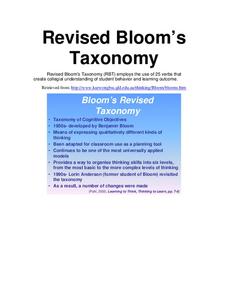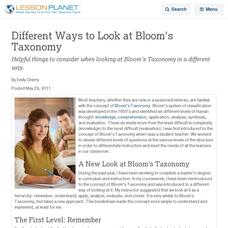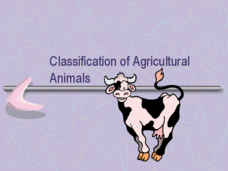Curated OER
Taxonomy - The Science of Naming Organisms
Carolus Linnaeus designed the binomial nomenclature system of naming organisms that is still in use more than 200 years later. By viewing this PowerPoint, upcoming biologists learn how to use it. They are also introduced to the hierarchy...
Universiti Tunku Abdul Rahman
Revised Bloom’s Taxonomy
For decades Bloom's Taxonomy has helped to guide educators' approach to instruction, but as times change and students change, so too must the methods for teaching evolve. Introducing teachers to the new revised...
Curated OER
Taxonomy
Biology novices name the seven levels of classification and use binomial nomenclature for naming living organisms. The first half of this presentation bestows a brief history of taxonomy, while the second half instructs on how to use our...
Curated OER
Bloom's Taxonomy for Ethan Frome: Chapter Four
As your class progresses through Chapter four of Ethan Frome, provide them with these thought-provoking questions built using Bloom's Taxonomy.
Curated OER
Paradise Lost: Bloom’s Taxonomy of Thinking Processes
Chapter II of John Milton's Paradise Lost provides the text for a series of comprehension questions crafted using Bloom's Taxonomy.
University of Hawaiʻi
Taxonomy and Me!
Taxonomy is the study of organisms and how you phylum. Three biology activities are included, helping scholars understand four of the six kingdoms, specifically Protista, Plantae, Fungi, and Animalia. Scholars observe and classify...
LABScI
Taxonomy: Who is in My family?
Find similarities in seemingly unlike organisms. The second instructional activity in a series of 12 builds the concept of a taxonomy and explores the use of a dichotomous key. Learners begin in part one by attempting to group a set of...
Curated OER
The Joy Luck Club: Bloom's Taxonomy: Questions
Really challenge your class when they're reading Amy Tan's The Joy Luck Club. Provide them with this list of six thought-provoking questions to encourage a deeper analysis. The questions are based off of Bloom's Taxonomy, and a list of...
Curated OER
Things Fall Apart: Bloom's Taxonomy of Thinking Processes
One of the things that makes Bloom's Taxonomy so effective is that it works off different levels of understanding. Test your readers' knowledge, comprehension, application, analysis, synthesis, and evaluation with these short questions....
Curated OER
Freshwater Fish Anatomy & Taxonomy
Tenth graders use a classification key to identify organisms. In this classification lesson students identify freshwater species of fish and document their observations.
Novelinks
Wildwood Dancing: Questions using Bloom’s Taxonomy of Thinking Process
Readers respond to a series of questions focused onJuliet Marillier's young adult novel Wildwood Dancing, and crafted to reflect the levels in Bloom's Taxonomy.
Iowa State University
A Model of Learning Objectives (Revision of Bloom's Taxonomy)
What would a three-dimensional representation of Bloom's revised taxonomy of the cognitive domain look like? Get a glimpse of the complex classification system that is frequently referenced in education to distinguish levels of...
Brigham Young University
A River Runs Through It: Blooms Taxonomy
Designed for teachers who use Norman Maclean's autobiographical A River Runs Through It, this one-page resource offers discussion question structured using Bloom's Taxonomy.
Novelinks
The Little Prince: Blooms’ Taxonomy Questions
Question what you read with a lesson based on Bloom's Taxonomy. As kids read The Little Prince by Antoine de Saint-Exupéry, they formulate questions with cues from a graphic organizer, and answer them to work on critical...
Novelinks
Nightjohn: Bloom's Taxonomy Questions
After completing Nightjohn, Gary Paulsen's young adult novel about slavery set shortly before the Civil War, readers respond to a series of questions crafted to reflect Bloom's taxonomy.
Novelinks
Things Fall Apart: Bloom’s Taxonomy
Promote critical thinking and literary analysis with a short activity. Readers of Chinua Achebe's Things Fall Apart respond to a series of questions modeled on Bloom's Taxonomy.
Curated OER
What's Your Genus? Scientific Classification and the VT
Students learn about binomial nomenclature, the scientific system of classification. In this scientific classification lesson, students work cooperatively to complete a binomial scavenger hunt using the internet and a Visual Thesaurus....
South Gloucestershire Council
Animal Classification: A Collaborative Sorting Activity for Key Stages 2 & 3
Introduce the logic behind a dichotomous key or administer a group performance assessment with a fun and challenging classification lesson. With explicit instructions for the teacher and for collaborative groups, as well as engaging...
Novelinks
The Crucible: Questioning Strategies Bloom's Taxonomy
Enrich your unit on Arthur Miller's The Crucible with a list of reading questions based on Bloom's Taxonomy. Kids answer questions and provide context for the knowledge, comprehension, application, analysis, synthesis, and...
Curated OER
Hoot: Bloom's Taxonomy- Questioning Strategy
What better way to examine a text than to ask your own questions? Use Bloom's taxonomy to guide kids through Carl Hiaasen's Hoot by asking questions based on knowledge, comprehension, application, analysis, synthesis, and evaluation.
Curated OER
Different Ways to Look at Bloom's Taxonomy
Here's a new way to look at Bloom's Taxonomy.
Curated OER
Classification of Agricultural Animals
Students of biology should find this powerpoint interesting as it recaps the basics of classification and Latin and common names of familiar farm animals. The slides are clear, not loaded with text, and lead the students through the...
Curated OER
INSECT TAXONOMY VIA THE INTERNET
Seventh graders explore how to classify insects and organize information.In this insect classification lesson students use the Internet to retrieve information on insects then organize the pictures to make a book project.
Curated OER
Taxonomy, Classification, and Dichotomous Keys
For this taxonomy worksheet, students use a dichotomous key for creatures found on planet Pamishan to identify each individual creature. This worksheet has 20 creatures to identify.

























